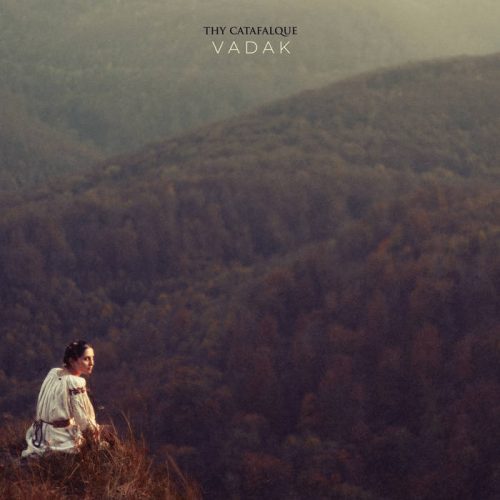
(Our old friend Professor D. Grover the XIIIth returns to NCS with this review of the new album by Thy Catafalque, which will be out tomorrow on Season of Mist. A full stream of the album follows the review.)
Greetings and salutations, friends. Once again, the impending release of something truly special rouses me from my nocturnal haze and guides me to my keyboard, compelling me to write. Yes, as the title of the article likely gives away, there is a new Thy Catafalque album ready to enter the public eye, and so I take upon myself the honor of reviewing it. Vadak is the tenth Thy Catafalque album, compilations and the Zápor EP notwithstanding, and as is fitting for such a significant number, it’s a truly noteworthy album in a discography full of noteworthy albums.
By this point in time, my devotion to the work of Tamás Kátai is a well-worn, well-documented history, but for the uninitiated, Thy Catafalque is primarily the work of one man, typically with a number of guests. Kátai is a Hungarian multi-instrumentalist and the driving force behind this project, and (as I will further explain in the paragraphs to come) is something of a musical genius. In the 23 years that Kátai has been recording under this moniker, the band’s style has evolved almost constantly from a relatively experimental black metal project to something that is, frankly, impossible to define. In the lead-up to this review, I did a chronological listen to the entire Thy Catafalque discography, front to back (including the first three albums, which are the most black metal releases and my least favorite simply because they’re the harshest and least listenable), and that endeavor served to further bolster the knowledge that Kátai’s musical fingerprints have been all over this project since the beginning.

To clarify this, you have to understand that Kátai’s music has a very distinctive sound, although trying to define that distinctiveness is more or less impossible for someone like me, who lacks all but the most basic understanding of music theory. It has a lot to do with the synths, and the melodies, and the distinctive sound of the programmed drums (more on that later), and how the songs are assembled. The result, then, is that Kátai can basically do just about anything musically and have it sound like his work.
Vadak (roughly translated, Wilds or Wildlings) is a perfect example of this. There is a song that sounds like Eluveitie. There is a song with ’80s style synthwave elements. There is a song with elements of smooth jazz. There is a song that reminds me of the theme from Rawhide. All of these are excellent and fit perfectly into this album, and if that sounds like absolute bullshit, well, I don’t blame you for thinking that. I wouldn’t believe it myself, if I hadn’t heard it.
I think that this album truly crystallized for me a thought that I’d been subconsciously working my way toward for the last several years and Thy Catafalque releases. Tamás Kátai has achieved mastery over his musical style, complete and utter mastery, and as a result he can do just about anything and make it sound very distinctively like his work. I’m convinced at this point that he could create a song based heavily on slide whistles, ukeleles, and fart noises, and I would hear it and know that it was his work. It’s a rarity in a constantly-changing music industry that grinds up and spits out artists at an incredible rate, for an artist to have that combination of talent, career longevity, and creative freedom necessary to achieve this level of mastery.
And now, we get to the actual meat of the review; if you’re still with me at this point, then I thank you for your patience. Vadak is, in my opinion, possibly my favorite Thy Catafalque album since Róka Hasa Rádió, the album that served as my introduction to the band. It is also arguably the heaviest Thy Catafalque album since Rengeteg. Like any Thy Catafalque release, musical guests are to be expected, but Vadak has an unusually large number of them, contributing in numerous ways to the variety present on this album.
Vadak opens with ‘Szarvas’, and Kátai wastes no time in finding ways to subvert the listener’s expectations. After a wonderful synth intro, I can feel a sense of anticipation of the heavy groove that the song is going to drop into, only for the song to club me in the head with a massive wall of guitars and blast beats. This holds for a short time, and then the expected groove drops in, but at this point a warning has been thrown down: be prepared for the unexpected. ‘Szarvas’ continues to both meet and subvert expectations, with vocal contributions from Martina Veronika Horváth (becoming a regular with her fourth straight Thy Catafalque collaboration) and Reason vocalist Gábor Dudás as well as the first of several guitar solos (a Thy Catafalque rarity) played by Breno Machado.
The second track, ‘Köszöntsd A Hajnalt’ (roughly translated: Greet The Dawn), is the aforementioned track that sounds like Eluveitie, thanks to the heavy riff, strong lead vocal from Horváth, and Lochrian Poem multi-instrumentalist Andrei Oltean on redpipes. (The redpipes are a fascinating sort of digital bagpipes capable of emulating a number of different pipe tones.) Still, this song still has Kátai’s distinct style, especially noticeable in the song’s quieter synth section, and the redpipe solo and Machado guitar solo give the track a little extra something.
The next three tracks, ‘Gömböc’ (roughly translated: Sphere), ‘Az Energiamegmaradás Törvénye’ (roughly translated: The Energy Conservation Act), and ‘Móló’ (roughly translated: Pier), perfectly encompass what I love about Thy Catafalque. Each song starts with some obliteratingly heavy riffing, and then each song diverges and morphs into something entirely different. ‘Az Energiamegmaradás Törvénye’ especially starts with a straight-up thrash riff and is, until this point, one of the heaviest things Thy Catafalque has ever laid to tape (at least, until you get further on in this album, but more about that later). Even then, Kátai takes what might be a fairly straightforward thrash riff and molds it, twists it, changes it into something much, much more, and it’s an incredible process. And that’s only the first half of the song, as it shifts to a more mid-paced, almost industrial metal track, and then again to something vaguely like The Cure with clean guitars.
‘Móló’, meanwhile, has a more mid-paced (but still incredibly heavy) riff backed by a synthwave groove that recalls the Stranger Things theme (I realized that there are many, many synthwave tracks I could reference, but it’s actually a fairly solid comparison). This ratchets up significantly in the middle portion of the song, as the tempo kicks into high gear and Watch My Dying vocalist Gábor Veres makes an appearance. Incredibly, the final third of the song shifts again, this time to full-on synthwave, as the groove from the first third of the track returns, augmented by some high-treble, Kavinsky-esque (https://youtu.be/MV_3Dpw-BRY) synths, showing that if Kátai ever decided that he wanted to make a retrowave album, he’d probably do a damn fine job.
Things take a different turn on the next two tracks. ‘A Kupolaváros Titka’ (roughly translated: The Secret Of The Dome City, presumed to be a reference to a Hungarian sci-fi novel of the same name) is an odd, kind of a retro, smooth-jazz track that reminds me in some ways of ‘Sunday Lunch’ by Carpenter Brut (https://carpenterbrut.bandcamp.com/track/sunday-lunch). Meanwhile, ‘Kiscsikó (Irénke Dala)” (roughly translated: Little Foal – Song By Irénke) has a galloping country-western feel and a beat that initially reminds me of the theme to Rawhide, which is fairly appropriate given the title. The two tracks make for an interesting diversion.
‘Piros-Sárga’ (roughly translated: Red-Yellow) served as the first music released from Vadak, and it’s a great track, featuring a propulsive tempo, funk-laced bass, horns, a variety of percussion instruments, and Kátai’s signature keyboard work, topped by a great vocal performance by Superbutt frontman András Vörös. It’s heavy without being overly metal, and it’s a perfect summation of the Thy Catafalque sound.
The album’s penultimate track, ‘Vadak (Az Átváltozás Rítusai)’ (roughly translated: Wilds – Rites of Transformation), is probably the album’s crowning achievement. It’s similar in structure to ‘Móló’, in that it’s broken into three distinct portions, all of which could very easily stand on their own as individual tracks. The riffing that fuels the first third of the song is probably the heaviest Thy Catafalque riff ever (I told you I’d get to this); I remember hearing this song for the first time on the way to work, and it made me yell “WOOOOOOO” out loud in my car. From here, the song shifts to stabbing synths and strings, underscoring Horváth’s third vocal contribution with extensive violin and saxophone solos, before shifting once more into black metal mode, Kátai’s blackened screams transitioning the track into its final, furious form.
The album closes with the beautiful, introspective ‘Zúzmara’ (roughly translated: Hoarfrost), a spare track (updated from Erika Szobája, Kátai’s 2005 ambient album) composed mostly of piano and some ambient synth pads providing accompaniment to Horváth’s finest performance. Her ethereal voice, multi-tracked and harmonizing with herself, is captivating, providing the perfect closing to an incredible album.
Once again, if you’re still with me at this point, then I thank you for your patience. If you’re familiar with Thy Catafalque, then I have no doubt that you’ll be very happy with this particular release. If you’re not familiar with the art of Tamás Kátai, then I can think of no better place to start. At the halfway point of the year, I can say without a doubt that this is my favorite release of 2021 so far, and I expect that it’s still going to be in that position by year’s end.
PRE-ORDER / PRE-SAVE:
https://shopusa.season-of-mist.com/band/thy-catafalque
https://orcd.co/tcpiros
https://thycatafalqueuk.bandcamp.com
THY CATAFALQUE:
https://tamaskatai.bandcamp.com/
http://www.facebook.com/thycatafalque
